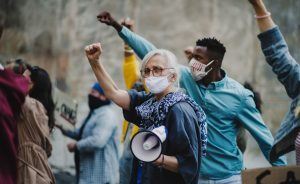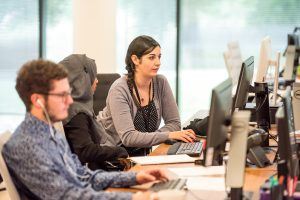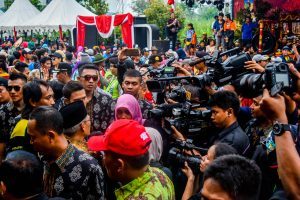Civic Space and Open Government Reform in Asia and the Pacific
Espacio cívico y reforma del gobierno abierto en Asia y el Pacífico
As reformers across Asia and the Pacific explore ways to open government, civic space is an essential starting point. To underpin successful reforms, governments must enable people to speak freely, act in coordination, and advocate for change. The OGP process presents an opportunity to strengthen democratic freedoms and empower civil society in the region.
Australia, Indonesia, the Kyrgyz Republic, Mongolia, New Zealand, Papua New Guinea, the Philippines, the Republic of Korea, and Sri Lanka have initiated 12 OGP commitments focused on civic space. In particular, since 2019, more countries are addressing civic space through the OGP platform. Papua New Guinea, for example, included commitments on cooperation between government and civil society organizations in both of its action plans. In 2021, Indonesia and Mongolia began their first commitments to improving the environment for civil society – including a promising Mongolian reform intended to amend legislation on source anonymity for journalists. The most ambitious initiatives have emerged from action plans developed with strong civil society partnership.
While this is a promising start, many of the civic space commitments made by OGP members in Asia and the Pacific have failed to achieve noteworthy results – in part, because they have not always pledged to make concrete improvements. According to CIVICUS, more than half of the member countries in the region are classified as obstructed or repressed. Now more than ever, it is critical that countries in the region address civic space restrictions both through the OGP framework and beyond. Here are a few actions to take:
- Enable civil society to operate and access resources by removing barriers, including to foreign funding. The ability to access resources is an essential component of freedom of association under international law. The Philippines now requires all international aidMore and better information about aid helps partner countries and donor institutions plan and manage aid resources more effectively, parliaments and civil society to hold governments accountable for t... for civil society organizations to be cleared by the government. This is likely to have a chilling effect on foreign contributions and organizations’ ability to access resources. OGP countries in the region should revise frameworks governing access to resources, to ensure that civil society organizations are not subject to more restrictive regulatory regimes than those applied to other entities.
- Amend anti-terrorism frameworks to support civic freedom. The region has seen an increasingly securitized approach to civil society. Recent laws and policies—for example in the Philippines and Sri Lanka—directly target civil society activities by adopting overbroad definitions of terrorism that facilitate crackdowns on the legitimate exercise of freedom of expressionJournalists and activists are critical intermediaries connecting public officials with citizens and serving as government watchdogs, and their rights and safety need to be protected. Technical specifi... More, assembly, and association. OGP members should commit to reviewing and amending these frameworks for human rightsAn essential part of open government includes protecting the sacred freedoms and rights of all citizens, including the most vulnerable groups, and holding those who violate human rights accountable. T... compliance with inputs from civil society.
- Roll back civic space restrictions related to COVID-19. Many countries in Asia and the Pacific implemented states of emergency that granted expansive state powers, blanket bans on assembly, and the criminalization of the spread of false information. For example, in Indonesia, law enforcement officials investigated street artists for paintings critical of the government’s response to the pandemic. In April 2020, Mongolia enacted a law which prohibits the media from disseminating false information on COVID-19, raising concerns over violations of legitimate expression. Many such measures appear to be indefinite, without any sunset provisions, and have limited judicial or legislative oversightEffective parliamentary oversight of the executive branch is key to the integrity of democratic systems and, by extension, to the open government agenda. Technical specifications: Commitments that inv.... This type of measure should be reviewed, revised and, as appropriate, retired through participatory processes engaging a diverse array of stakeholders, especially as public health justifications subside.
- Expand participation mechanisms to ensure meaningful public consultation in law and policy-making. Mechanisms for public participationGiving citizens opportunities to provide input into government decision-making leads to more effective governance, improved public service delivery, and more equitable outcomes. Technical specificatio... have historically been lacking across much of the region and were further eroded as a result of the pandemic. However, meaningful and inclusive public participation is essential to making government more effective and more responsive to the needs of the population. OGP members should also ensure that the right to public participation is recognized in law.
These efforts must go further than vague promises. Commitments that lay out the specific changes to improve civil society’s operational environment are critical to achieving lasting reforms. At the outset, reformers can build in guarantees, designing commitments that clearly outline ambitious numeric, geographic, and financial targets.
Reformers can draw on each others’ strategies. For example, in the Philippines, a commitment expanded access to online government-civil society town hall meetings. This opened local civil society organizations’ engagement with government decision makers, providing a platform for dialogue on a range of policy issues, including civic space restrictions. In the Kyrgyz Republic, the OGP process embedded civil society experts in a risk assessment on terrorist financing, which lowered the risk of new restrictions in their sector. This daily collaboration laid groundwork for government stakeholders’ broader inclusionOGP participating governments are working to create governments that truly serve all people. Commitments in this area may address persons with disabilities, women and girls, lesbian, gay, bisexual, tr... More of civil society expertise, for example on amending the law on nonprofit organizations.
Convening diverse coalitions is another tool for achieving reform. Coalitions often have more legitimacy and better access to resources. Civil society and government reformers can broaden engagement to include champions from parliament, the justice system, local government, media, trade unions, or the private sector. Reformers can also draw on the new OGP Democratic Freedoms Learning Network to connect with peers who face similar challenges.
Through OGP, countries in Asia and the Pacific can build on recent progress by working with civil society partners to lift key civic space restrictions. An enabling environment for civil society can promote sustainable achievement of open government reform.
So how will you empower civil society in your country?
En Asia y el Pacífico, un grupo de reformadoras y reformadores están explorando cómo abrir el gobierno. En ese contexto, la apertura del espacio cívico es un punto de partida fundamental. Para poder apuntalar reformas exitosas, los gobiernos deben dar a las personas la oportunidad de hablar libremente, trabajar coordinadamente y promover cambios. OGP representa una oportunidad para fortalecer las libertades democráticas y empoderar a la sociedad civil de la región.
Australia, Indonesia, Kirguistán, Mongolia, Nueva Zelanda, Papua Nueva Guinea, Filipinas, la República de Corea y Sri Lanka iniciaron 12 compromisos enfocados en el espacio cívico. Específicamente, desde 2019 una mayor cantidad de países están trabajando en atender el espacio cívico a través de la plataforma de OGP. Por ejemplo, Papúa Nueva Guinea incluyó compromisos sobre un proceso de cooperación entre el gobierno y la sociedad civil en sus dos planes de acción. En 2021, Indonesia y Mongolia implementaron sus primeros compromisos enfocados en mejorar el ambiente operativo para la sociedad civil. Específicamente, Mongolia se comprometió a reformar el marco legislativo alrededor de la anonimidad de las y los periodistas. En este proceso, las iniciativas más ambiciosas fueron desarrolladas a partir de planes de acción desarrollados en estrecha colaboración con la sociedad civil.
Éste es un primer paso prometedor, pero muchos de los compromisos enfocados en el espacio cívico que los miembros de OGP de Asia y el Pacífico han establecido no han logrado resultados importantes, en parte debido a que no siempre se han comprometido a acciones concretas. De acuerdo con datos de CIVICUS, más de la mitad de los miembros de la región se clasifican como obstruidos o reprimidos. Hoy, más que nunca, es fundamental que los países de la región reduzcan las restricciones al espacio cívico, tanto a través del proceso de OGP, como fuera de él. A continuación describimos algunas medidas que pueden tomarse.
- Eliminar barreras a la sociedad civil, promoviendo un ambiente operativo adecuado y acceso a recursos (por ejemplo el acceso a financiamiento internacional). La capacidad de acceder a recursos es un elemento esencial de la libertad de asociación como parte del derecho internacional. Hoy, Filipinas exige a la sociedad civil que cualquier financiamiento internacional sea sujeto a una revisión por parte del gobierno, lo cual probablemente tenga un efecto paralizador en las contribuciones financieras y en la capacidad de las organizaciones de acceder a recursos. Los miembros de OGP de la región deben evaluar el marco legislativo sobre el acceso a recursos, asegurando que las organizaciones de la sociedad civil no estén sujetas a regímenes regulatorios más estrictos que los que se aplican a otras entidades.
- Reformar los marcos legales antiterrorismo para apoyar la libertad cívica. La región ha tomado un enfoque de titularización a la sociedad civil. Por ejemplo, en Filipinas y Sri Lanka, regulaciones recientes están enfocadas en las actividades de la sociedad civil, adoptando definiciones demasiado amplias del terrorismo que resultan en medidas severas en el ejercicio legítimo de la libertad de expresión, asamblea y asociación. Los miembros de OGP deben comprometerse a revisar y reformar estos marcos en respeto a los derechos humanos y en colaboración con la sociedad civil.
- Eliminar las restricciones al espacio cívico que surgieron a partir del COVID-19. Muchos países de África y Asia implementaron estados de emergencia que otorgaron más autoridad al estado, prohibiciones generalizadas al derecho de asamblea y penalizaron la difusión de información falsa. Por ejemplo, en Indonesia, funcionarios investigaron a artistas urbanos por haber hecho obras que criticaban la respuesta del gobierno a la pandemia. En abril de 2020, Mongolia publicó una ley que prohibía a los medios difundir información falsa sobre el COVID-19, lo cual generó inquietudes sobre posibles violaciones a la expresión legítimas. Muchas de estas medidas parecen no estar limitadas en el tiempo y no son supervisadas de forma adecuada por el poder legislativo o judicial. Este tipo de medidas debe ser evaluadas y, según sea necesario, eliminadas a través de procesos participativos en colaboración con diversos actores, especialmente cuando se elimine la justificación asociada a temas de salud pública.
- Ampliar los mecanismos de participación para asegurar verdaderas consultas en el diseño de políticas públicas. Históricamente, los mecanismos de participación pública han sido deficientes en una gran parte de la región, lo cual se exacerbó con la pandemia. Sin embargo, una verdadera participación pública es fundamental para mejorar la eficiencia y capacidad de respuesta del gobierno. Los miembros de OGP deben asegurar que el derecho a la participación pública sea obligatorio por ley.
Estos esfuerzos deben ser más que promesas vagas. Para lograr reformas duraderas, es fundamental crear compromisos que establezcan cambios específicos dirigidos a mejorar el ambiente operativo de la sociedad civil. En el inicio, las reformas pueden establecer garantías que determinen claramente metas numéricas, geográficas y financieras.
Las y los reformadores pueden aprender entre sí. Por ejemplo, en Filipinas mejoró el acceso a las reuniones municipales. Así, se abrió la participación de la sociedad civil local y la acercó a tomadores de decisiones de gobierno, creando una plataforma de diálogo sobre diversos temas de política, incluyendo las restricciones al espacio cívico. En Kirguistán, a través del proceso de OGP, se invitaron a expertas y expertos de la sociedad civil en una evaluación de riesgos sobre financiamiento al terrorismo, con lo que se redujo el riesgo de crear más restricciones al sector. Esta colaboración diaria estableció una mejor inclusión de la sociedad civil, por ejemplo sobre enmiendas a la ley sobre organizaciones de la sociedad civil.
Reunir diversas coaliciones es otra herramienta que puede utilizarse para crear reformas. Las coaliciones tienden a otorgar legitimidad y acceso a recursos. La sociedad civil y el gobierno puede ampliar la participación, incluyendo a actores del parlamento, sistema judicial, gobiernos locales, los medios, sindicatos y el sector privado. Las y los reformadores pueden aprovechar la red de aprendizaje de OGP sobre libertades democráticas, vinculándose con colegas que enfrentan retos similares.
A través de OGP, los países de Asia y el Pacífico pueden aprovechar los avances recientes, trabajando con la sociedad civil para levantar las restricciones a la sociedad civil. Un ambiente operativo adecuado para la sociedad civil puede promover reformas de gobierno abierto sustentables.
¿Cómo vas a empoderar a la sociedad civil de tu país?
No comments yet
Related Content
 Challenges and Solutions
Challenges and Solutions
Civic Space as a Key Prerequisite of Open Government Reforms in the MENA Region
Since joining OGP, Jordan, Morocco and Tunisia have made over 129 commitments. These have included strong commitments on improving access to public information and open data, but when it comes…
 Challenges and Solutions
Challenges and Solutions
OGP Launches the Democratic Freedoms Learning Network
 Challenges and Solutions
Challenges and Solutions
Algorithms and Human Rights: Understanding Their Impacts
Human rights algorithmic impact assessments have emerged as an accountability tool to identify potential harms, mitigate unintended impacts, and inform policy decisions on the use of algorithms across key policy…


Leave a Reply